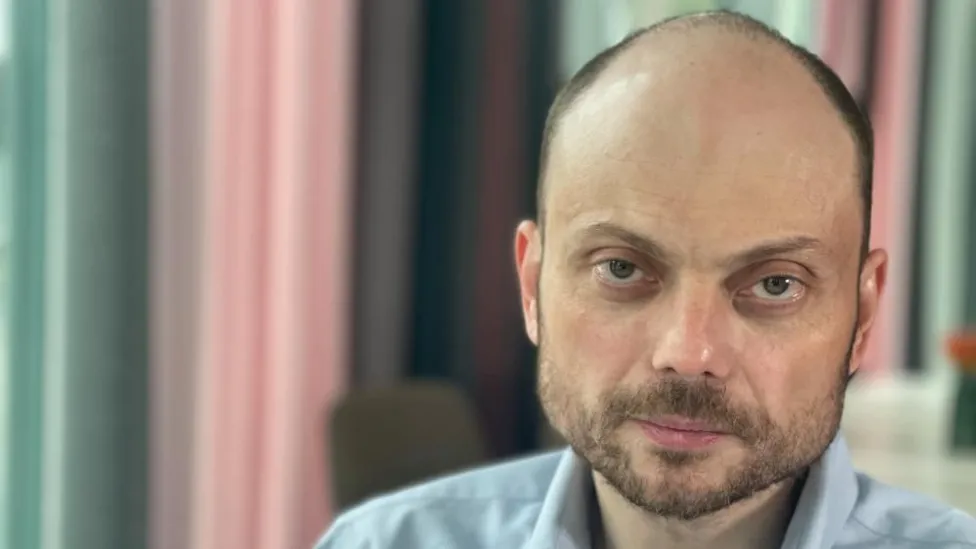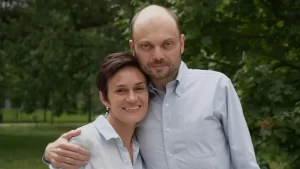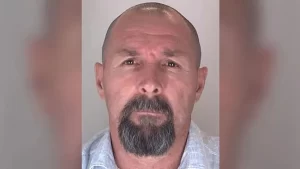Russian dissident tells BBC he thought he would die in ‘Putin’s prison
5 min read
“I was absolutely certain I would die in Putin’s prison.”
It’s almost the first thing Vladimir Kara-Murza tells me after his surprise release in the biggest prisoner exchange since the Cold War.
The Russian opposition politician is painfully thin – from stress, he says. He’s also still reeling from his abrupt transfer from a high security jail in Siberia into forced exile, after more than two years behind bars.
“It’s surreal, like I’m watching a film,” he describes the feeling. “But it’s a good film,” in which he’s finally been reunited with the family he hasn’t seen since his arrest in Moscow in April 2022.
His youngest son has been following him everywhere, anxious not to let him out of his sight.
Vladimir Kara-Murza, who is also a British citizen, was convicted of treason and sentenced to 25 years for his fierce and persistent condemnation of Vladimir Putin and the full-scale invasion of Ukraine.
He has spent the past 11 months straight in solitary confinement, made to fold away his bed each morning at 05:00 and only given paper and pen for an hour or so each day.
“It’s so easy to lose your mind. You lose sense of time, space. Everything really,” he reveals, in one of his first long interviews since release. “You do nothing, speak to no one, go nowhere. Day after day after day.”
He was denied phone calls home, only allowed to speak to his children twice in over two years.
The added punishment was even tougher, physically.

Almost a decade ago, Vladimir Kara-Murza nearly died from an unknown toxin and still suffers from after-effects, including nerve damage. In September, he now reveals, a prison doctor gave him “a year, 18 months at best” to live, if he stayed behind bars.
“After two FSB poisonings, I don’t exactly have the right state of health for a strict regime prison,” he explains, with a wry smile.
Last week, Kara-Murza was one of eight Russian dissidents who went missing from their prisons.
As lawyers and relatives sounded the alarm, rumours of a looming swap began to swirl. The prisoners themselves had no idea.
Instead, when guards burst into Kara-Murza’s cell in Omsk he thought he would be “led out to be shot”, he recalls. “I actually thought they were going to execute me.”
He’d recently been instructed to sign a request for a presidential pardon but refused to beg for mercy from Vladimir Putin, who he denounces as “a dictator, usurper and a murderer”.
Kara-Murza was transferred to Moscow and the notorious Lefortovo FSB jail. Five days later he was led out to board a bus and saw the other dissidents inside, each one with an FSB guard in a balaclava.
Another guard then took the bus microphone and announced they were being taken for a prisoner swap, no details.
“No-one asked our consent,” Kara-Murza says. “We were loaded onto a plane like cattle and flown out.”
The activist landed in Germany in the only civilian clothes he owned: black long-johns and T-shirt, and the flip flops he used for the prison shower.
The Russian dissidents were part of a “bundle” of political prisoners released, along with high-profile US nationals like the journalist Evan Gershkovich.
Three were former activists from the team of Alexei Navalny, the opposition politician who died suddenly in prison earlier this year. Originally, Navalny was to be part of the complex swap.
In return for the dissidents, Russia got a handful of spies and criminals including the key prize sought by Vladimir Putin: an FSB hitman known as Vadim Krasikov who’d murdered in broad daylight in a Berlin park.
The judge sentencing him to life in prison had called the killing an act of “state terrorism”.
“To everyone who criticises this [swap], I would respectfully urge them not to think of prisoner exchanges but of saving lives,” Kara-Murza argues, in response to the controversy over freeing Krasikov.
The killer was welcomed home to a red carpet and a hug from Putin himself.
“Aren’t 16 lives worth releasing one murderer?”

For a long time, Germany wasn’t sure. The delay, Kara-Murza argues, may be what cost Alexei Navalny his life.
The joy of the Kara-Murzas’ reunion is marred by thoughts of the Russian detainees who were not released.
“I’m so happy and overwhelmed to see these people free, but also very sad so many people were left behind,” his wife Evgenia tells me. “I feel guilty.”
Memorial human rights organisation lists hundreds of political prisoners and she had been campaigning hard for a priority group.
“There are people with serious medical conditions, like Alexei Gorinov who’s missing part of his lung, who don’t have a lot of time.”
Her husband talks of those “still languishing in Putin’s Gulag” and the hope of further exchanges.
He had only been free himself for five minutes, when he strayed into controversy.
In statements made soon after landing in Germany, Vladimir Kara-Murza argued that sanctions in relation to the Ukraine war should be better targeted.
There was immediate uproar from Ukrainians who claimed his priority on walking free was to soften Russia’s punishment for waging war.
Kara-Murza calls it calibration.
“I need more information,” he admits. “I realise that February 2022 changed a lot.”
But he wants to know why a Russian human rights lawyer can’t travel to the Baltic states for a conference, when a Russian missile containing a Western-made chip can slam into a residential building in Ukraine.
“The responsibility for what the Putin regime is doing there is shared by Russian society, a large part of which chose to close their eyes to the abuses and repression,” he argues.
“But let’s not forget the responsibility of those Western countries who for years preferred to deal with Vladimir Putin and do business, knowing full well who he was and what he represented.”
In 2022, Vladimir Kara-Murza was arrested because he insisted on being inside Russia and speaking out. Now he’s barred from travelling, he worries about his right to call others there to action. He thinks he’ll feel “more constrained”.
But he will continue condemning the war on Ukraine.
“Putin can’t be allowed to win this war. Ukraine must win, and there should be more support from Western countries so that happens,” he argues.
Historically, he says, “windows of opportunity” for democratic change open after “disastrous military defeat”.
When his plane out of Russia was taking off, the FSB guard next to Kara-Murza told him to look out of the window.
“He said it was the last time I was seeing my motherland.” The activist laughed. “I said, I’m a historian, so I am sure I will be back in my country.”
“And it will be much quicker than you think.”







